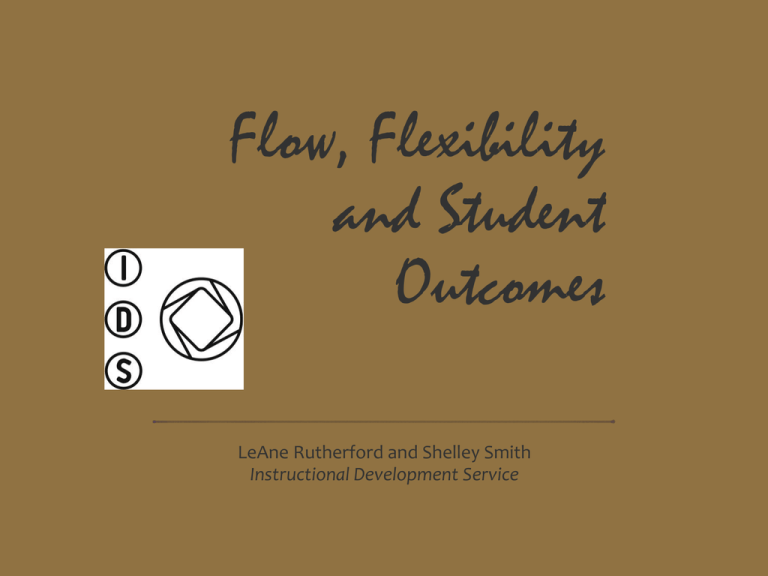Flow, Flexibility and Student Outcomes
advertisement

Flow, Flexibility and Student Outcomes LeAne Rutherford and Shelley Smith Instructional Development Service Agenda • Rethinking Your Courses: Adaptability, Flexibility and Flow • Identifying Essential Course Competencies • Identify Authentic Assessment Options • Course Communication • Final Thoughts Impact on Your Courses • Student illness and variable attendance • Potential Faculty Illness • Increased need for assignment, testing, and course communication flexibility • Accomplishing all this without disrupting the course flow or “bottom-line” competencies Identify Important Course Competencies? Course Competencies/Outcomes •Plan SMART: •Specific •Measurable •Attainable •Results-oriented •Time-bound Competency/Outcomes Examples • Business Principles of Management: Identify and integrate methods of organizational structure and the related topics of division of labor, authority/responsibility, span of control, centralization/decentralization, delegation, organizational change, staffing, and diversity within the workforce. • Chemistry 1: Name and write formulas for inorganic compounds Adapting Learning Assessments? Adapting Assessments Think about: • Focus on Adaptability and Flexibility • More frequent testing (option to discard one) • Alternative testing methods • Variety of assignments to achieve single objective • Adapting different learning technologies Assessment Variations • Qualitative • Quantitative • Direct • Indirect • Application • Declarative… Direct Methods: • • • • • • • • • • • • • • • Samples of individual student work Pre-test and post-test evaluations Standardized tests Performance on licensure exams Blind scored essay tests Internal or external juried review of student work Case study/problems Capstone papers, projects or presentations Project or course-imbedded assessment Documented observation and analysis of student behavior/performance Externally reviewed internship or practicum ePortfolio Activity logs Performances Interviews (including videotaped) Examples • Management: Graded Practical Exercise “Who Goes Abroad Management Team Decision” (20 points, covering topics of organizational structure). • Chemistry: Laboratory Experiment—Inorganic nomenclature (40 pts.) • How could these be done electronically? Student Communication Student Communication • What do you do now? • What if F2F is not an option for all students? • What are your electronic options? • Email • Course alias • CMS mail and news options Final Considerations • Know what’s Important • Evaluate your comfort level • Identify support systems • ITSS (electronic options) • IDS (Curriculum flexibility)


